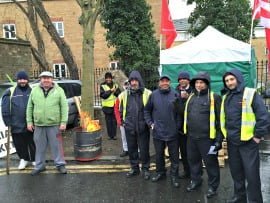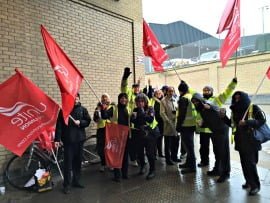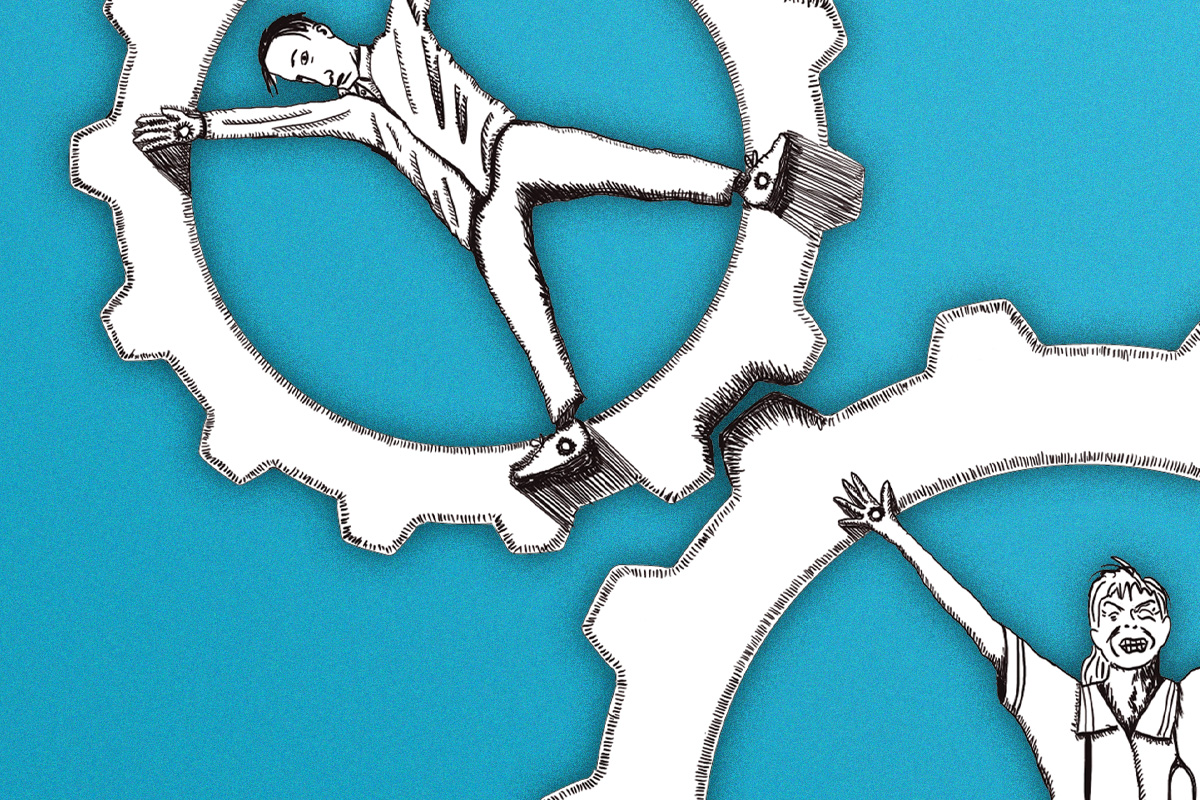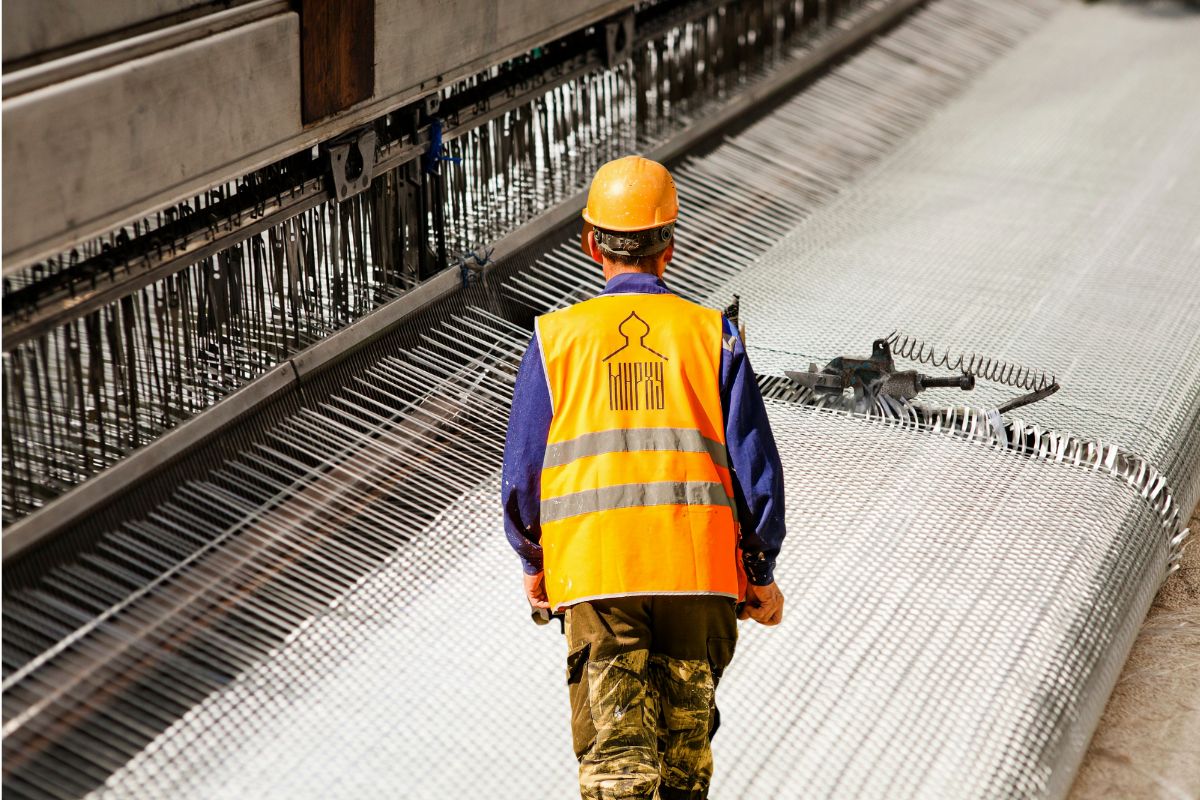Yesterday, on Thursday 5th February, bus drivers across London came out on strike for 24 hours – the first of three planned days of strike action in February. Despite the freezing cold, picket lines were strong and morale was high. Supporters of Socialist Appeal and members of the Marxist societies in London visited the picket lines to offer their solidarity to the bus drivers.
Yesterday, on Thursday 5th February, bus drivers across London came out on strike for 24 hours – the first of three planned days of strike action in February. Despite the freezing cold, picket lines were strong and morale was high. Supporters of Socialist Appeal and members of the Marxist societies in London visited the picket lines to offer their solidarity to the bus drivers.
With two more 24-hour strikes planned for 13th February and 16th February, it is time for the Unite the Union leaders to step up the action by calling for their brothers and sisters in the other transport unions to join them – to unite and fight against the bosses and their Tory representatives.
We publish here reports from four of the picket lines across London.
Hackney
London’s bus drivers feel increasingly alienated and pushed out of the very city for which their work is so essential. They are currently taking strike action over huge pay inequality in the London bus network; however, I was told by those on the picket line that “we could strike over almost anything”.
One driver I spoke to was on strike despite being one of the ‘beneficiaries’ of the unfair pay scheme between different companies. In this bus depot there are, ridiculously, two bus companies operating. This driver is on £12 per hour, but drivers for the other company are on £9. He said it was extremely unfair in general – that the way the system is designed makes it incredibly hard to climb up pay scales. Nowadays you would have to be a driver for 5 or 10 years just to start earning £12 per hour.
The drivers are very political and radicalised. Some complained about the weakness of the strike and about how so many drivers were ignoring it. However, this was not the case the last time they went out on strike. The management puts immense pressure on the drivers and have all kinds of new-fangled means to police them; and in the context of a lack of leadership in the unions and wider labour movement, many workers of course try to keep their head down to survive. They all feel that to inspire the drivers as a whole the union “has to toughen up”. We have already reported on the pressure and bullying of management elsewhere. It is clear that bus drivers, like most other sections of the working class, have been enduring, for more than a decade, worsening conditions and constant pressure and bullying from management.
Every bus company in London now monitors their drivers for the ‘smoothness’ of their driving; the drivers have an electronic key with which they are monitored, and if the bus brakes too quickly they are disciplined – even though this is frequently because the bus hasn’t been repaired or because a pedestrian or other driver has gotten in the way (again, see the article referred to above). Additionally, bus companies send ‘mystery shoppers’ – a common practice throughout the service sector – to board buses and check if the drivers are smiling and saying hello to each and every passenger, which they are ludicrously now required to do! If they are found not to greet the ‘mystery shopper’ in this way, this is reported and they are placed on disciplinary. The drivers always feel like they are one day away from being sacked.
The drivers work in a bus garage in the same area of London in which they were born and raised. And yet none of them can even afford to live in London anymore, having to commute in at a great cost of time and money. There is a constant chatter in the press about how well London is doing, how it is pulling away from the rest of the country, as if this were a middle-class paradise. The reality is that the working class in London are in some ways the most squeezed in the whole country, and the property price rises are reaching utterly intolerable levels. London’s bus drivers, essential to the functioning of this most profitable of cities, can see what is happening to their home and are furious. Sooner or later this situation will produce an explosion of class struggle in London.
The drivers are confident of winning the strike, because they know that without their hard work the city would grind to a halt. However, winning equal pay is clearly just one of a huge list of demands that need to be achieved. Immense contradictions are piling up, and underneath the surface, the working class is seething with anger – against the falling standard of living, against bullying from management, worsening conditions and zero-hour contracts, endless work-place pressure, debt and the inability to afford a place to live. It is only a matter of time before this explodes into the open.
Kings Cross and Holloway
 On a cold Thursday morning, I visited my local bus depots in Kings Cross and Holloway. I was met at both by a strong display of militancy, with picket lines of around 15-20 bus drivers at both. Despite the freezing conditions, the drivers were in good spirits, but were nevertheless quick to express their anger and fury towards the bosses over their refusal to meet a simple demand: equal pay for equal work.
On a cold Thursday morning, I visited my local bus depots in Kings Cross and Holloway. I was met at both by a strong display of militancy, with picket lines of around 15-20 bus drivers at both. Despite the freezing conditions, the drivers were in good spirits, but were nevertheless quick to express their anger and fury towards the bosses over their refusal to meet a simple demand: equal pay for equal work.
One recently recruited female bus driver at the Holloway depot – one of the largest in Europe – summed up the situation well: “We all have to do the same tests to become a driver, and we all face the same risks every day – so why should we get paid any differently?”
Another, more longstanding driver, echoed these sentiments, noting that “it’s not like firefighters and nurses working at different fire stations or hospitals across London get paid differently for doing the same job, so why should we?”
Pete Kavanagh, regional secretary of Unite the Union for the London & Eastern region, visited the picket at Holloway to talk with the drivers. In a speech to those present, Kavanagh highlighted the absurdity of the bus companies’ refusal to accept an equal levelling-up of pay across London on the grounds that “there isn’t the money for it”. The Unite regional secretary pointed out that the bus companies together made over £700 million in profits last year, and would in fact still make over £100 million in profits if the equal wage rates that the union is demanding were brought in.
Those on the picket lines were not short of strong words against the bosses of the private bus companies and of TfL, expressing their clear class hatred for these profiteering fat-cats and the rich Tories who represent them in Parliament. “It’s not our fault these b**tards privatised what used to be a public service,” one of the drivers exclaimed, correctly identifying the privatisation of the bus service as the cause behind the current pay disparities and the race to the bottom between workers. From identifying such a cause, the logical conclusion is for the bus companies to be brought back into public ownership, and those drivers I spoke to were all positive about such a demand.
As if to emphasise the vast inequality between the drivers – who are forced to compete against each other by the 18 private bus companies – and the bosses who own these parasitic firms, the picketers at Holloway stopped one of the management as they attempted to cross the picket line and leave the depot, and nobody failed to notice the luxury car that this well-paid manager was leaving in.
Despite the presence of the regional secretary of Unite at one of the pickets, rank-and-file union members at both pickets were angry that the union had not done more to prepare for this latest round of strikes. According to numerous reports from those picketing, the management had put in a great deal of effort since the last strike, earlier this year, in order to frighten and pressurise workers into not going on strike this time round. Meanwhile, the union representatives had been notable by their absence, and those at the Kings Cross picket line stated their disappointment that none of the full-time union staff had come to visit, despite having their head office just down the road.
Most importantly was the disappointment that the Unite leaders were not utilising their full power in order to win their demands. Several drivers noted how the Tube drivers in the RMT union had also taken strike action over the last year, over cuts to jobs. In addition, even cab drivers have demonstrated recently en masse. “Imagine if we all came out together – bus drivers, Tube drivers, and cab drivers. We’d paralyse the City! The bosses and the Tories would have to listen to us then!”
Indeed, as is often said, not a lightbulb shines and not a telephone rings without the kind permission of the working class. If the union leaders organised joint action across the transport sector – and, indeed, across all sectors as part of a general strike – then the result would be an unstoppable force.
Camberwell
I visited Camberwell bus garage on the way home from work yesterday, where the picket line was still going strong at 6pm with 10 to 15 bus drivers out. The fact that the drivers were out on the picket line all day is a definite sign of their militancy – especially given how cold it was!
The bus drivers had remarkable energy considering most of them had already been picketing for more than twelve hours. They’d brought along a sound system and were using it to play music and explain the strike to people walking by and waiting at a nearby bus stop. They were talking in clear class based terms, attacking the bus companies and the huge pay of their directors, as well as the Tories and Boris Johnson in particular. One of the most vocal drivers (who wasn’t actually the shop steward) had been a driver for over 30 years and was extremely angry and militant, even though he was on the highest rate of pay and the strike demands wouldn’t benefit him.
All of the drivers agreed with the demand for the nationalisation of the bus companies and for the drivers to be employed directly by TfL, even though these demands aren’t being put forward by the Unite the Union leaders.
Those on the picket line said the strike was a bit weaker than the one in January, but they were still confident they could win. TfL said on the day that bus services were still running at 50% compared to 30% for the last strike, reflecting the huge pressure and intimidation they’ve put drivers under in order to get them to break the strike.
With two more days of action planned for Friday 13th and Monday 16th of February, it is clear that the London bus drivers are willing to continue the fight for their demands. I will be going back to the same picket to offer my support.






